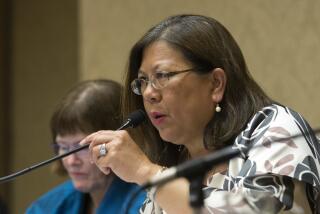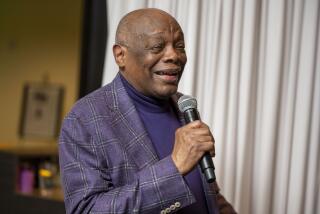Jerry Brown’s popularity as governor doesn’t extend to a presidential race
Katherine Martinez is a Democrat from San Andreas, fiercely supportive of her state’s — and party’s — governor.
“I have definitely followed him and definitely voted for him,” she said of Jerry Brown, and she has pushed back on anyone who had “the nerve” to criticize him.
But vote for him for president against that far-more-probable candidate, Hillary Rodham Clinton?
“Oh, man,” she said, and then grappled with why. “You know, Hillary has got the international experience Jerry Brown has not — and only on that reason I would go with Hillary. I love both of you.”
She is not alone. In a new USC Dornsife-Los Angeles Times poll, Brown has zoomed in popularity. He is now the most popular politician on the state stage. Almost two-thirds of voters — a cosmically high proportion — approve of how he’s doing his job. Almost six in 10 Californians have a positive view of him.
And Hillary Clinton would clock him in his home state were the two to meet in a run for the presidency.
Not that that is actually going to happen. Clinton keeps insisting that she’s marking off the pros and cons of a run, all the while building a campaign organization that will be ready from Day One to clobber a few competing Democrats no one has ever heard of.
People have heard of Brown, but his campaign calculus is different. He has toyed a bit with the idea of running a fourth time for president but has bowed to reality. He’s 76 years old, closing in on 77 in April, meaning that he would be 78 on election day were he to thwart sanity and run. He’s a sitting governor in a state that is ungovernable from afar.
But, oh, how the wayback machine would spurt to life if a presidential campaign pitted Brown against a Clinton. Brown is, after all, the presidential candidate who, in 1992, called Bill Clinton a “hypocrite” and the “prince of sleaze” and “a fraud” and predicted that he’d “destroy the Democratic Party.”
Brown is the candidate who, that same year, took part in a debate with Clinton that resembled a roller-derby rumble, each man ending up figuratively bloodied and unkempt. It was that debate, in Chicago, in which Brown took on Hillary Clinton’s financial and legal dealings in Arkansas.
“Let me tell you something, Jerry,” Clinton said in one finger-shaking exchange. “I don’t care what you say about me.... But you ought to be ashamed of yourself for jumping on my wife.”
Small historical note: That exchange led Hillary Clinton to defend her career in words that, while heartfelt, gave heartburn to campaign staff members who had to explain that she hadn’t meant to slight stay-at-home mothers: “I suppose I could have stayed home and baked cookies and had teas, but what I decided to do is fulfill my profession.”
By the end of that campaign, feelings were so raw that Brown didn’t do Clinton the traditional grudging courtesy of endorsing him.
The follies continued in 2010, when Brown was running for governor against the moneyed Republican Meg Whitman. Whitman aired an ad reprising Bill Clinton’s 1992 criticism of Brown, prompting Brown to defend himself in a rather unseemly way — by raising the specter of Clinton’s affair with Monica Lewinsky.
“I mean Clinton’s a nice guy, but who ever said he always told the truth?” Brown said during an East Los Angeles appearance. “You remember, right? There’s that whole story there about did he or didn’t he. OK.... I did not have taxes with this state.” (The latter a not-very-transparent reference to Clinton’s assertion that he “did not have sexual relations with that woman.”)
But politics is a transactional business, and arguably the best politicians are the most transactional. Clinton endorsed Brown two days later and campaigned for him as well.
The theory has held that Brown, however tempted, would not run for president again because of the afore-mentioned complications. The poll, conducted for the USC Dornsife College of Letters Arts and Sciences and The Times, demonstrated another reality: Even in Brown’s home state, there’s really no demand for him.
Overall, California voters sided with Hillary Clinton over Brown 49% to 26%, and 20% sided with neither. Among Democrats, it was even worse for Brown: 61% for Clinton to 25% for him. Among the Democratic Party’s key voter groups, just as bad: Latinos went for Clinton 57% to 26%; women went for her 54% to 22%; and liberals sided with her 66% to 23%.
This is how locked-in Clinton’s vote was: Even among those who said they have a favorable view of Brown and approve of the way he’s done his job, he couldn’t exceed 30%.
Brown’s closest showing was among Republicans, who went for Clinton 29% to 26% (with a hefty 42% saying neither one, thank you.)
Dan Schnur, director of USC’s Jesse M. Unruh Institute of Politics, said it made sense for Brown to be doing well in California — but falling hard before Clinton in a mock presidential run.
“Voters like them for very different reasons and very different roles,” he said. “She is a trailblazer. He is adult supervision. She says, ‘Let’s shatter the glass ceiling.’ He says, ‘Get off my lawn.’ ”
Regular voters are not quite that caustic. Chuck Todd, like Katherine Martinez a poll respondent, said that he sided with Clinton not because he dislikes Brown — in fact, he thinks Brown “has done a really good job here” — but because of what Clinton would bring to a campaign.
“I think she’s got an awareness of international concerns,” said Todd, a freelance infographics artist from Concord (and not the identically named “Meet the Press” host). “I think she’s going to be a strong leader because of her background.”
Twitter: @cathleendecker
ALSO:
Column: Who killed at CPAC, the GOP’s red meat 2016 auditions?
Op-Ed: California’s public unions have too much clout and compensation
Republican Congress struggles for stable footing as funding standoff continues
More to Read
Start your day right
Sign up for Essential California for news, features and recommendations from the L.A. Times and beyond in your inbox six days a week.
You may occasionally receive promotional content from the Los Angeles Times.







